💬 The 6 best AI shopping assistant tools for e-commerce
AI shopping assistants are everywhere nowadays. But unfortunately, many “AI assistants” end up being little more than a generic chatbot. They deliver fast answers, but true personal guidance is missing. That’s why choosing the right type of AI shopping assistant matters more than you might think. This article gives you an overview of the best AI shopping assistant tools, explains the difference, and guides you in how to pick the right one for your business.

In short
- AI shopping assistants come in three categories: product discovery and advice, customer service, and AI search.
- Not all assistants are equal, some act more like receptionists, while others are more like in-store experts.
- The best AI shopping assistant tools right now are: Aiden, Bloomreach Clarity, Rep AI, Fin AI by Intercom, Algolia, and Gorgias.
- Choosing the right tool depends on your goals: reducing support workload, improving product discovery, or boosting conversion structurally with expert guidance.
- For stores that want to offer personal advice to boost conversions, Aiden offers structured, scalable advice that goes beyond generic AI.
Categories of AI shopping assistants explained
If you’re considering AI shopping assistants for your store, it helps to understand what types of assistants exist and what role they play in the online shopping experience.
3 different categories of AI shopping assistants
We can distinguish three main categories of AI shopping assistants. Let’s have a look at the differences and why they matter.
Product discovery, product advice & recommendation agents
Product discovery, product advice and recommendation agents are AI-powered tools that act as the product experts in your store. They help customers choose the right product through structured advice, recommendation quizzes, contextual suggestion blocks, or even conversational shopping experiences.
Instead of relying on guesswork, they explain why a product is a good match, giving customers confidence in their decision.
Customer service assistants
Customer service assistants are the front desk of your store. They handle questions like “Where’s my order?”, “Do you ship internationally?”, or “How do I return this item?”. Some can also suggest products based on browsing data or past purchases, but this is usually generic and limited.
They’re designed first and foremost to reduce support workload, not to deliver the nuanced product advice that helps customers choose the right item with confidence.
AI search assistants
These tools upgrade the classic search bar into a conversational and personalized experience. Instead of just returning product lists, they use AI to understand intent, suggest relevant results, and sometimes even answer questions in natural language.
They’re especially powerful for large catalogs where navigation can feel overwhelming. But while they make product discovery smoother, they typically stop short of structured advice, meaning they don’t replace the role of true product experts.
With these three categories in mind, we’ve listed the top AI shopping assistants below.
The top 6 AI shopping assistant software tools
Now you know exactly what types of AI assistants are available in e-commerce, let’s have a look at the best solutions available. We’ve selected these tools based on their category, user reviews and reputation in the market.
1. Aiden
Aiden, that’s us indeed, is Europe’s leading guided selling platform, designed to turn your in-store expertise into digital shopping advice. Unlike generic AI that “guesses” what someone might want, Aiden helps you structure your actual product knowledge and deliver it across the shopping journey.
Our AI copilot can even draft quiz flows and recommendation rules based on your product catalog, which your team then fine-tunes with the nuance and expertise that makes your store unique.
Whether it’s through product finders, product checks, full page or conversational chat interfaces, Aiden ensures your customers always get trustworthy, expert advice just like you’d get in an offline store. Stores using Aiden see significant impact. For example, adding our product check on PDPs has delivered up to 15% more add-to-carts.
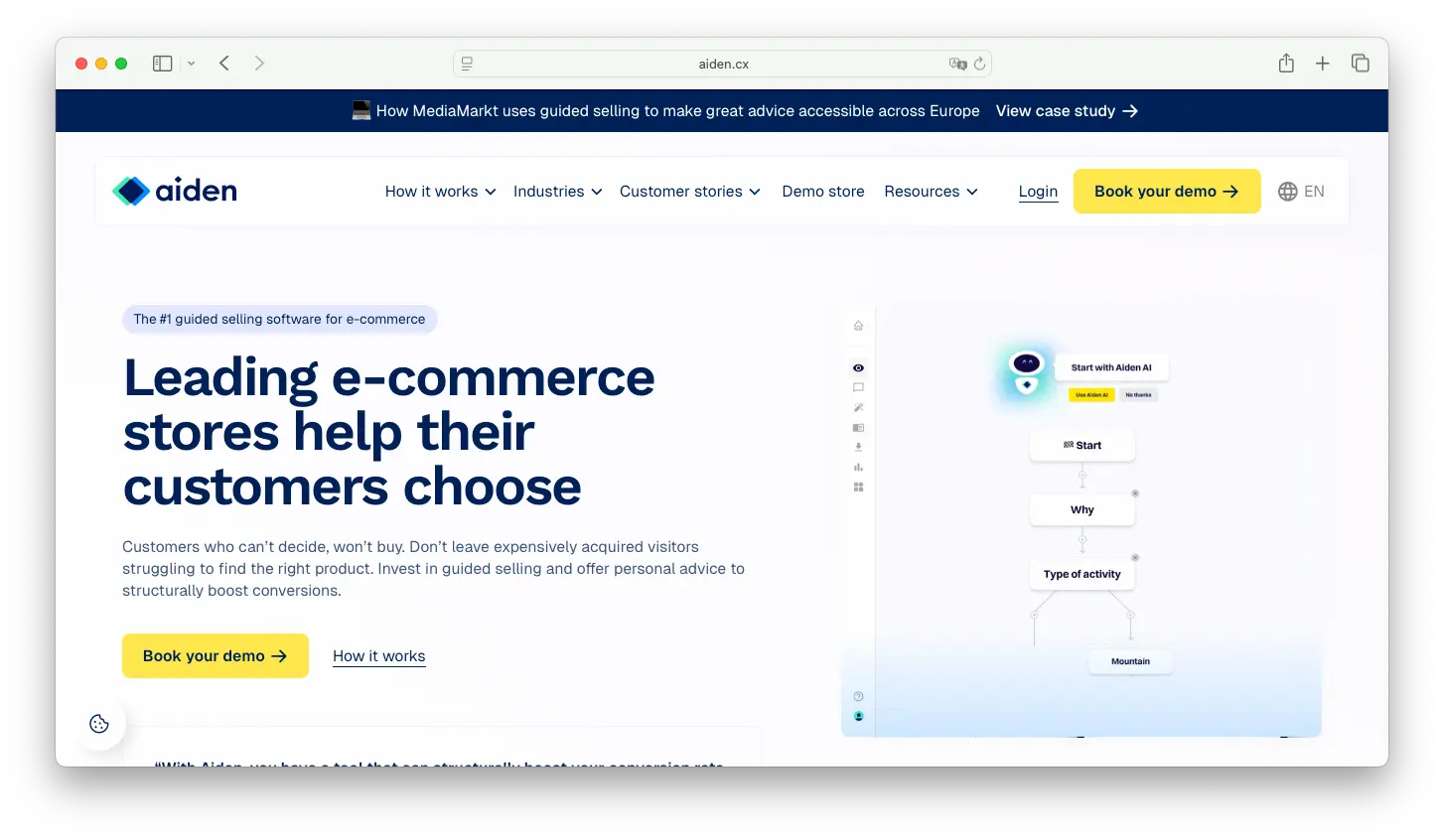
Key features:
- AI-powered product finders & recommendation quizzes
- Aiden AI to quickly build, optimize, and scale your product finders
- Dynamic advice logic (weights, scoring, filters)
- Explanations for why a product is recommended
- Flexible display options: sidebar, pop-up, full-page, conversational
- Product-detail page (PDP) checks
- Zero-party data collection through quizzes
- Integrations with major e-commerce platforms, GA4, CDPs and ESPs
- Multi-language and multi-market support (discover MediaMarkt’s European approach here)
- Impact dashboard for deep performance insights
AI-category: Product discovery, product advice & recommendation agents
“The numbers speak for themselves: we see 18% more add-to-carts and 11% more purchases. That’s why we have been working with Aiden for two years now, and why we currently have 14 assistants live." - Thomas van den Berg, E-commerce Manager Veneta
2. Bloomreach Clarity
Bloomreach is a digital experience platform (DXP) that helps brands deliver personalized commerce experiences across channels. Its full solution covers search, merchandising, content, and customer data. Within that suite, Bloomreach Clarity is their AI shopping assistant focused on conversational product discovery.
Clarity allows customers to interact with online stores in a more natural way, typing or speaking to the search bar as if they were talking to a sales associate. By using AI and natural language processing, it interprets intent, surfaces relevant products, and tailors recommendations to each shopper’s needs.
While Clarity makes product discovery faster and more intuitive, it doesn’t replace structured product expertise. It can show what’s available, but it rarely explains why a specific product is the right choice.
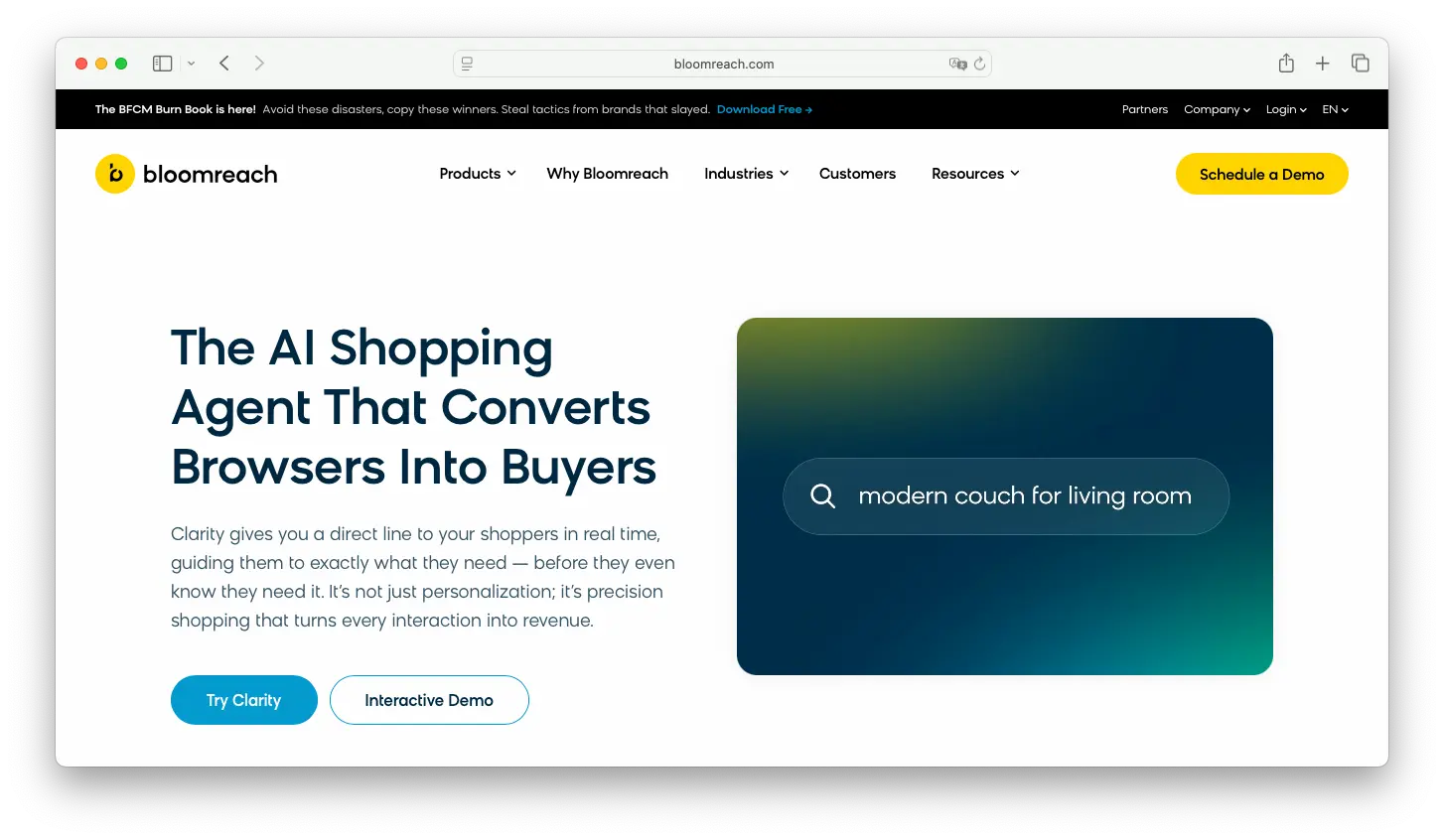
Key features:
- Conversational search and product discovery
- Personalized recommendations
- Conversational AI to refine searches
- AI-driven merchandising and ranking
- Integration with Bloomreach Content and Engagement (CDP)
- Multi-language support
AI-category: AI search assistant
3. Rep AI
Rep AI is a conversational shopping assistant that engages customers through chat-style interactions. Instead of browsing endless product pages, shoppers can ask questions in natural language and receive product suggestions.
While it makes discovery feel interactive, the advice is usually based on intent signals and available product data, not structured expertise. This makes Rep AI a good fit for brands that want to add conversational guidance quickly, but less suited for complex product categories where nuanced recommendations matter.
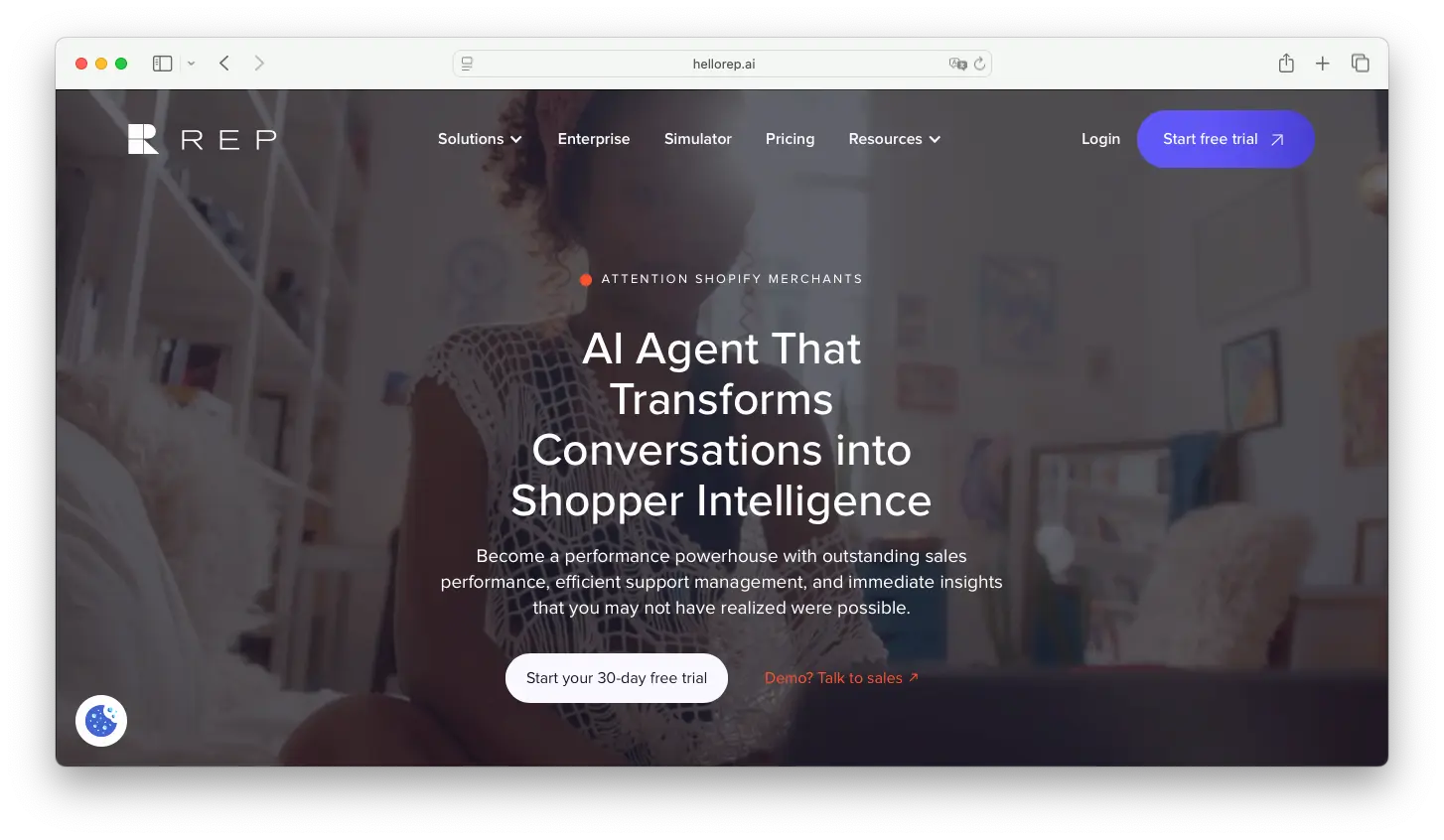
Key features:
- Conversational interface for product discovery
- AI-driven product recommendations
- Behavioral intelligence
- Integration with major e-commerce platforms
- Automated support agent
AI-category: Product discovery, product advice & recommendations
4. Fin AI by Intercom
Intercom is a leading customer communication platformg. With Fin AI, Intercom has added a generative AI assistant that helps brands handle both pre-purchase and post-purchase conversations.
For online stores, Fin AI can instantly answer product questions, suggest items based on customer intent, and guide shoppers to the right pages, making it a valuable assistant during the buying journey.
Fin’s product suggestions are usually based on general data and intent signals rather than structured expertise. That makes it great for quick answers, but less suited for complex buying decisions where nuanced advice is key.
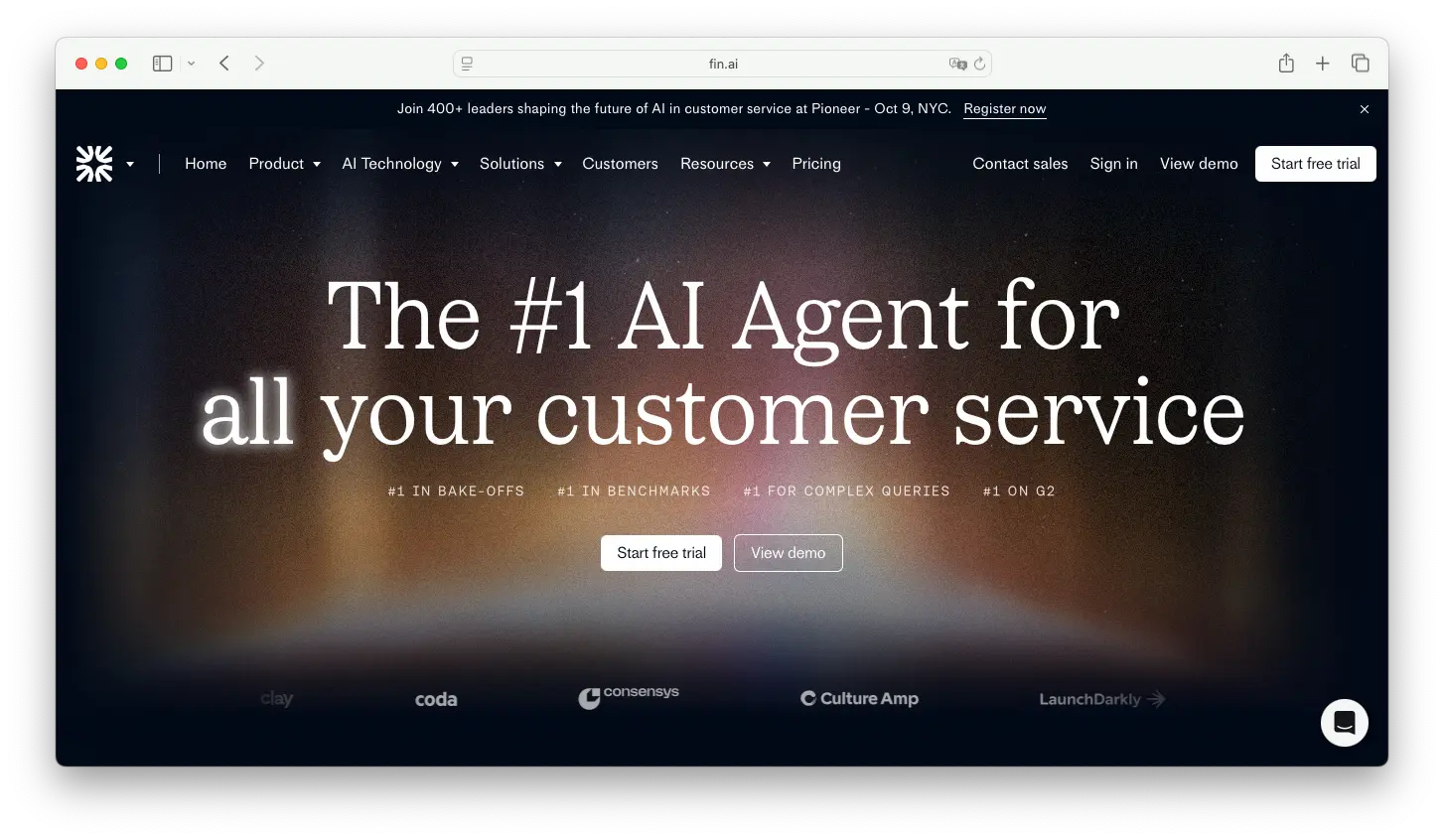
Key features:
- Conversational AI assistant for product and service questions
- Real-time product suggestions during shopping
- Multi-language support
- Escalation to human agents for nuanced cases
- Integrations with major e-commerce and CRM platforms
AI-category: Customer service assistant
5. Algolia
Algolia is a widely used AI search and discovery platform, powering product findability for many online stores. With its AI Search and Recommend solutions, Algolia upgrades the classic search bar into a smarter assistant.
It understands natural language queries, predicts intent, and surfaces personalized product suggestions based on browsing behavior. This makes it especially useful for stores with large or complex catalogs, where navigation can otherwise feel overwhelming.
Algolia excels at making search fast and relevant, but it typically stops short of offering structured product advice. It can tell shoppers what’s available, but not why one product might be a better choice than another.
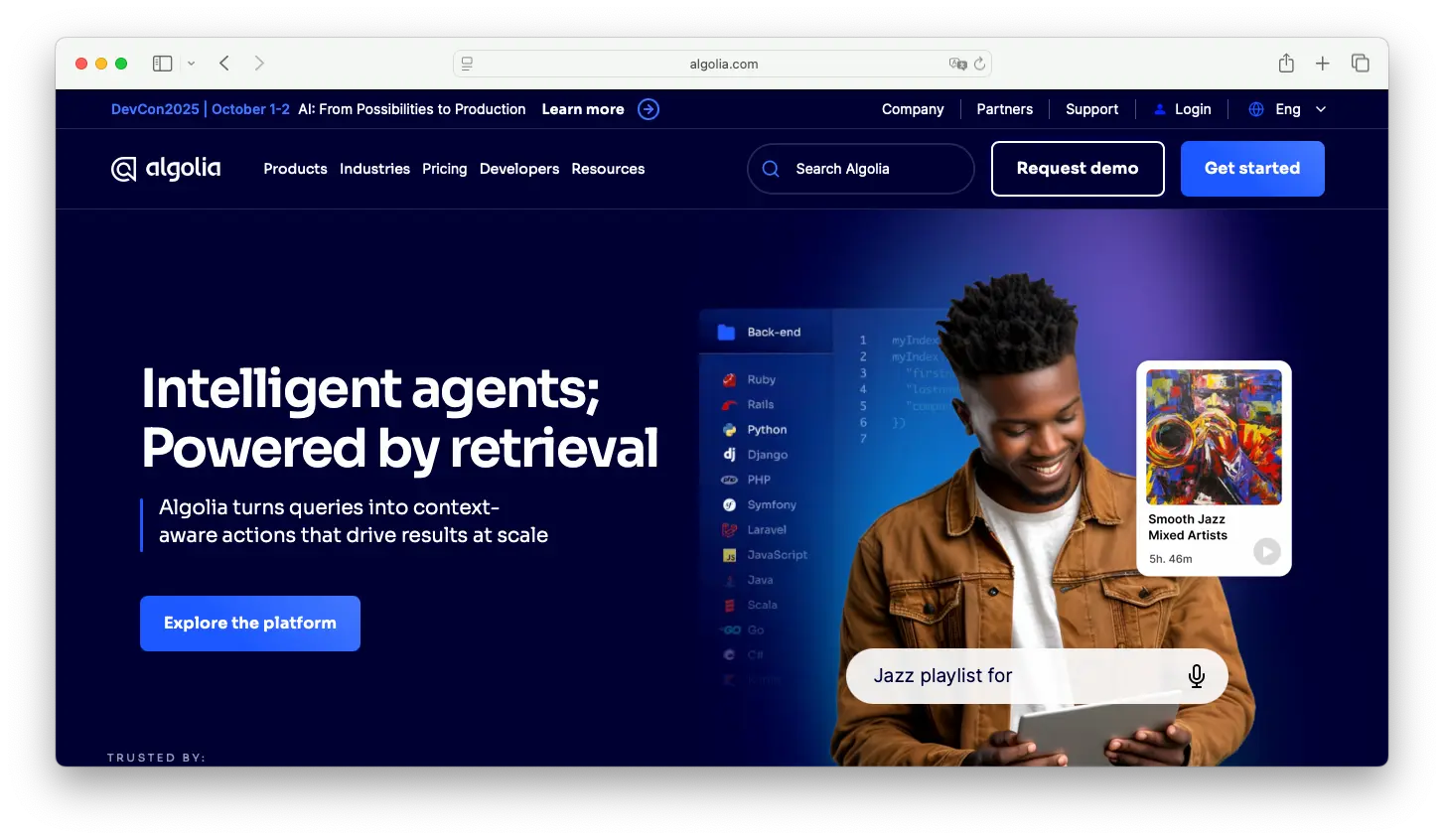
Key features:
- AI-powered search bar with autocomplete
- Personalized ranking and recommendations
- Natural language processing for conversational queries
- Multi-language support
- API-first architecture with wide integrations
AI-category: AI search assistant
6. Gorgias
Gorgias is a helpdesk platform built specifically for e-commerce brands. It centralizes customer communication across channels like email, live chat, social media, and SMS, while using AI to automate repetitive support tasks.
With its AI-powered autoresponders, Gorgias can instantly answer common pre- and post-purchase questions. It can also engage shoppers based on inventory or browsing behavior, for example by suggesting alternatives or offering discount codes to drive conversions.
Gorgias’ AI is mainly designed for support efficiency. For stores aiming to influence buying decisions, it’s more of a receptionist than a product expert.
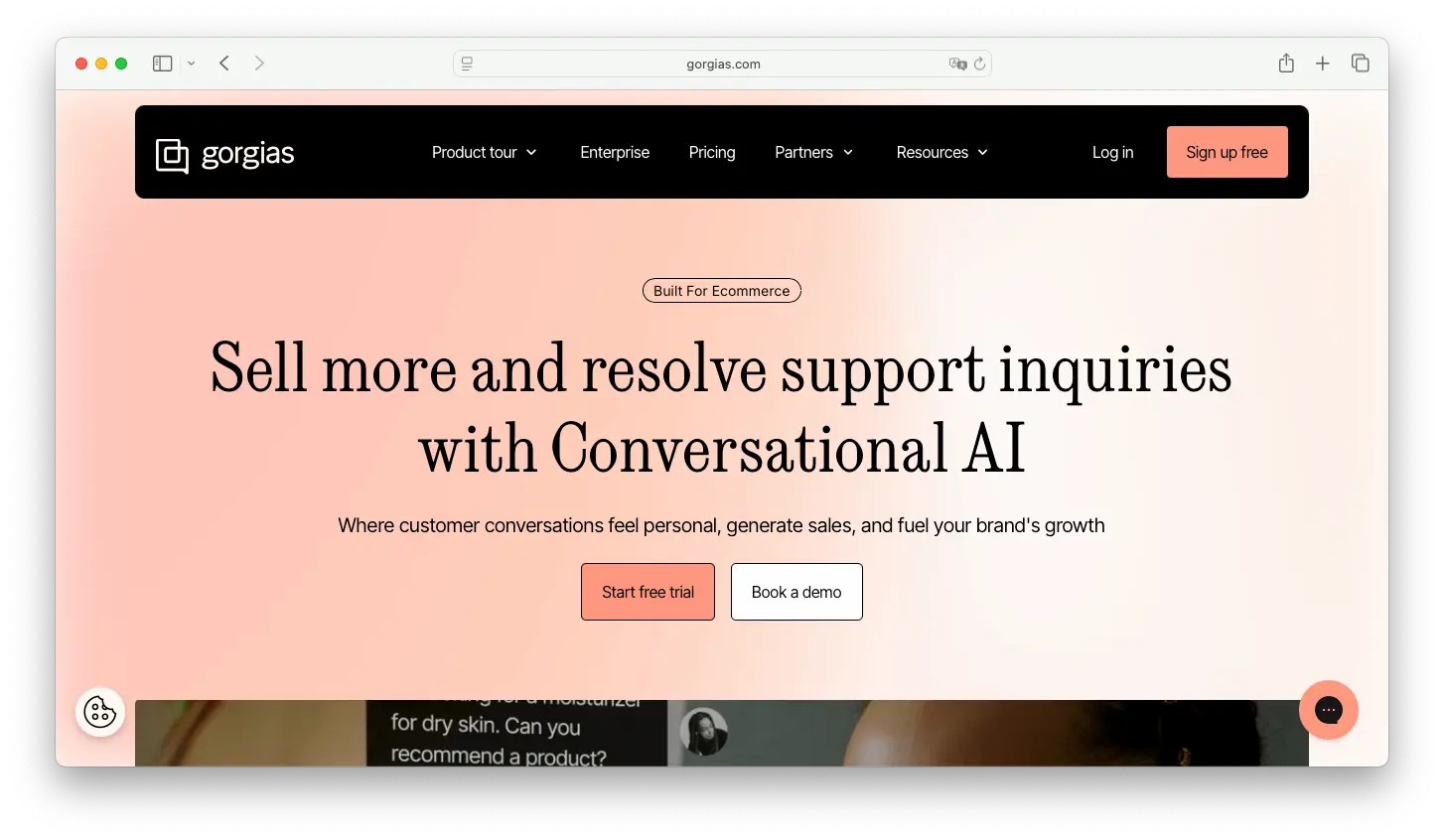
Key features:
- AI autoresponders for FAQs and order-related questions
- Centralized multi-channel support (chat, email, SMS, social)
- Deep integrations with Shopify, Magento, BigCommerce
- Automated workflows for tickets and macros
- Built-in analytics for performance tracking
AI-category: Customer service assistant
How to select the right AI assistant for your e-commerce business
Knowing what options are available is one thing, but how do you make the best choice for your business? It’s important that the AI assistant tool you select can help you reach your goals. And as it’s a customer-facing solution, you don’t want it to ruin your brand reputation. Here are five factors to consider that’ll help you to make a choice.
- Ease of implementation: Some solutions can be up and running in days. Some may require more technical resources to set up and optimize. If you’re looking to launch fast and test, start with a tool that offers a way to easily get started (with AI for instance), and support during onboarding.
- Customer support and onboarding: AI tools are only as good as the support behind them. Evaluate if you get support from in-house experts or if it’s simply a self-service solution. For something as critical as guiding your customers, you want a partner who helps you configure, optimize, and improve over time.
- Integration of your tech stack: The best AI assistants work where your team already does. Make sure the tool integrates with your e-commerce platform, your CRM, ESP, and even CDP. Without smooth integrations, the assistant risks becoming a siloed solution instead of strengthening your complete e-commerce strategy.
- Scalability: Think beyond your first use case. Can the tool grow with you as you expand into new product categories, languages, or markets? Choosing a scalable platform early saves costly replacements later.
- Type of AI integration: Not all AI is created equal. Some assistants are “black boxes” that generate answers without transparency, while others, like Aiden, let you structure your own expertise and keep control over the advice your customers receive. Decide whether you want quick automation (better for FAQs) or structured guidance (better for influencing buying decisions and increasing conversion structurally).
FAQs about AI shopping assistants
Still not sure? No worries, we’ve got you covered. We’ve gathered some frequently asked questions we hear from online retailers.
What are AI shopping assistants in e-commerce, exactly?
At their core, AI shopping assistants are tools that help online shoppers make decisions. They combine product data, customer input, and AI logic to answer questions or guide someone to the right product.
But not all assistants are created equal. Some act like receptionists, handling FAQs, shipping questions, or returns. Others act like in-store experts, guiding you to the right laptop, hiking boots, or coffee machine with clear reasoning. That’s the crucial difference.
What’s the difference between AI shopping assistants and regular chatbots?
AI shopping assistants focus on guiding customers to the right product with tailored recommendations. Regular chatbots mainly handle repetitive service tasks like order tracking, though some can suggest products, usually in a generic, less nuanced way.
What type of AI shopping assistant is best for my online store?
The best type of AI shopping assistant depends on your store’s biggest challenges and goals. If you want to reduce support workload, a service-focused assistant is a good fit.
But if your goal is to increase conversion while helping shoppers choose with confidence, especially in complex or high-consideration categories, a product discovery and advice assistant is a smarter choice.
What to expect beyond 2025 from AI shopping assistants?
The next wave of AI shopping assistants will go beyond a generic chatbot to deliver advice that feels truly expert. Instead of guessing, they’ll scale a store’s real product knowledge into conversational experiences, on-site and beyond, from search bars and even external channels.
We expect that winners in e-commerce will be stores that turn their expertise into structured, trustworthy guidance customers can access anywhere and anytime.
Upgrade your e-commerce strategy with Aiden AI
E-commerce has nailed “what to sell” and “how to deliver.” But the hardest part is still unsolved. How to help customers choose, just like a sales advisor does in a brick-and-mortar store. Shoppers aren’t looking for a shelf full of products, they want guidance they can trust.
That’s exactly why we wrote a book called “Customers who can't decide, won't buy”. Because those customers you acquired via expensive ads? You don’t want to lose them, right? That’s why we decided to turn our vision into software to deliver automated, personal advice that structurally boosts conversions.
Unlike generic AI that guesses, Aiden structures your real product knowledge into digital shopping assistants that feel like your best in-store expert. Whether through product finders on lister pages, or checks on product pages Aiden makes sure your customers get recommendations with reasoning, so they understand and trust your advice.
In a world of copy-paste AI answers, that’s how expert stores stand out. With advice that’s consistent, personal, and unmistakably theirs.
We’re already powering 200+ leading online retailers across Europe, helping them turn knowledge into conversions , and we’d love to help you do the same. Want to see how? Book a demo or explore our platform tour and start making guidance the advantage your store is known for.
Stop losing customers to choice paralysis
Empower your shoppers with tailored product advice (at scale) to significantly increase conversion rates.


